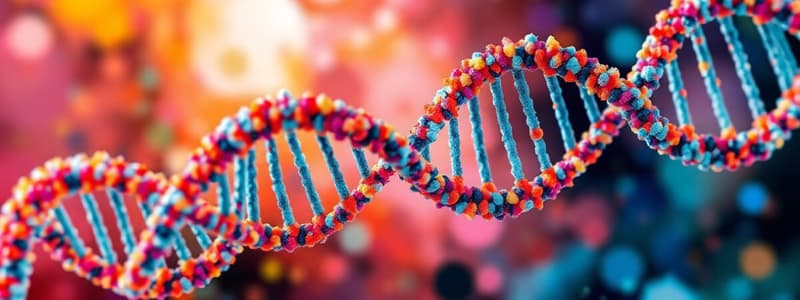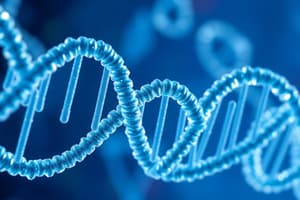Podcast
Questions and Answers
What is the purpose of inserting a gene into a vector?
What is the purpose of inserting a gene into a vector?
- To initiate cellular respiration
- To eliminate genetic variation
- To produce proteins in a host organism (correct)
- To prevent genetic recombination
What does the term 'vector' refer to in genetic engineering?
What does the term 'vector' refer to in genetic engineering?
- A protein that regulates gene expression
- A carrier that introduces foreign DNA into a host (correct)
- An organism that is genetically modified
- A sequence of base pairs in DNA
Which step follows the introduction of a vector into a host organism?
Which step follows the introduction of a vector into a host organism?
- Replication of the vector in the host
- Degradation of the vector DNA
- Isolation of the recombinant DNA
- Selection of recombinant clones (correct)
What is the primary goal of selecting recombinant clones?
What is the primary goal of selecting recombinant clones?
Which process is primarily used to introduce vectors into host cells?
Which process is primarily used to introduce vectors into host cells?
What is the primary function of restriction enzymes in gene isolation?
What is the primary function of restriction enzymes in gene isolation?
Which technique is primarily used for amplifying specific DNA sequences?
Which technique is primarily used for amplifying specific DNA sequences?
What is complementary DNA (cDNA) primarily synthesized from?
What is complementary DNA (cDNA) primarily synthesized from?
Which of the following techniques would NOT be used for gene isolation?
Which of the following techniques would NOT be used for gene isolation?
Which statement is true regarding the role of PCR in biotechnology?
Which statement is true regarding the role of PCR in biotechnology?
What is the primary function of plasmids in genetic engineering?
What is the primary function of plasmids in genetic engineering?
Which of the following best describes viral vectors?
Which of the following best describes viral vectors?
What is a characteristic feature of artificial chromosomes?
What is a characteristic feature of artificial chromosomes?
Which of these statements about vectors for gene insertion is true?
Which of these statements about vectors for gene insertion is true?
What type of DNA does PCR amplify?
What type of DNA does PCR amplify?
What is the primary role of initial screening in the selection process?
What is the primary role of initial screening in the selection process?
Who is the director and founder of the Egyptian Center for Bioinformatics?
Who is the director and founder of the Egyptian Center for Bioinformatics?
Which university is associated with Ahmed Mansour Alzohairy?
Which university is associated with Ahmed Mansour Alzohairy?
What is the main focus of the Egyptian Center for Bioinformatics?
What is the main focus of the Egyptian Center for Bioinformatics?
What is a likely outcome of the selection and identification of recombinants?
What is a likely outcome of the selection and identification of recombinants?
What is one significant application of gene cloning in medicine?
What is one significant application of gene cloning in medicine?
Which therapeutic protein is specifically mentioned as being produced through gene cloning?
Which therapeutic protein is specifically mentioned as being produced through gene cloning?
What role does Ahmed Mansour Alzohairy have in relation to the field of bioinformatics?
What role does Ahmed Mansour Alzohairy have in relation to the field of bioinformatics?
Which of the following is NOT a typical application of gene cloning?
Which of the following is NOT a typical application of gene cloning?
What is a potential benefit of producing insulin through gene cloning?
What is a potential benefit of producing insulin through gene cloning?
What is a primary ethical consideration associated with genetically modified organisms?
What is a primary ethical consideration associated with genetically modified organisms?
Which aspect of genetic research relates to understanding how genes function?
Which aspect of genetic research relates to understanding how genes function?
What concern is associated with the environmental impact of genetically modified organisms?
What concern is associated with the environmental impact of genetically modified organisms?
How does gene function study contribute to agriculture?
How does gene function study contribute to agriculture?
In relation to agricultural practices, what does 'safety' refer to concerning genetically modified crops?
In relation to agricultural practices, what does 'safety' refer to concerning genetically modified crops?
Flashcards
Gene insertion
Gene insertion
A process where a gene is placed into a vector.
Vector introduction
Vector introduction
Adding the vector containing the gene into a host.
Recombinant clones
Recombinant clones
Copies of the genetically modified cells or organisms.
Vector
Vector
Signup and view all the flashcards
Host
Host
Signup and view all the flashcards
Restriction Enzymes
Restriction Enzymes
Signup and view all the flashcards
PCR Amplification
PCR Amplification
Signup and view all the flashcards
cDNA Synthesis
cDNA Synthesis
Signup and view all the flashcards
Gene isolation
Gene isolation
Signup and view all the flashcards
DNA
DNA
Signup and view all the flashcards
Plasmid
Plasmid
Signup and view all the flashcards
Viral vector
Viral vector
Signup and view all the flashcards
Artificial chromosome
Artificial chromosome
Signup and view all the flashcards
Recombinant
Recombinant
Signup and view all the flashcards
Selection
Selection
Signup and view all the flashcards
Screening
Screening
Signup and view all the flashcards
Initial screening
Initial screening
Signup and view all the flashcards
Genetically Modified Crops
Genetically Modified Crops
Signup and view all the flashcards
Gene Cloning
Gene Cloning
Signup and view all the flashcards
Safety Concerns (Gene Cloning)
Safety Concerns (Gene Cloning)
Signup and view all the flashcards
Environmental Impact (Gene Cloning)
Environmental Impact (Gene Cloning)
Signup and view all the flashcards
Ethical Considerations (Gene Cloning)
Ethical Considerations (Gene Cloning)
Signup and view all the flashcards
What are applications of gene cloning?
What are applications of gene cloning?
Signup and view all the flashcards
Gene Cloning in Medicine
Gene Cloning in Medicine
Signup and view all the flashcards
Therapeutic Protein Production
Therapeutic Protein Production
Signup and view all the flashcards
Gene Cloning in Agriculture
Gene Cloning in Agriculture
Signup and view all the flashcards
Gene Cloning in Research
Gene Cloning in Research
Signup and view all the flashcards
Study Notes
Gene Cloning and Recombinant DNA Technology
- Gene cloning is a core molecular biology technique
- Covers principles, techniques, applications, and ethical considerations
- The presentation explores gene cloning
Principles of Gene Cloning
- Isolation: Target gene is isolated
- Insertion: Gene is inserted into a vector
- Transformation: Vector is introduced into a host
- Selection: Recombinant clones are selected
Techniques for Gene Isolation
- Restriction Enzymes: These enzymes cut DNA at specific sequences
- PCR Amplification: Polymerase chain reaction amplifies specific DNA regions
- cDNA Synthesis: Complementary DNA (cDNA) is synthesized from mRNA
Vectors for Gene Insertion
- Plasmids: Circular DNA molecules that replicate independently
- Viral Vectors: Modified viruses used to deliver genetic material
- Artificial Chromosomes: Large DNA molecules designed for cloning large genes (e.g., Yeast Artificial Chromosomes - YACs)
Transformation of Host Organisms
- Bacteria: Commonly used for rapid growth and ease of manipulation
- Yeast: Eukaryotic host suitable for expressing complex proteins
Screening for Recombinant Clones
- Blue-White Screening: Uses a color change to identify clones with inserted DNA
- Antibiotic Resistance: Clones with the vector survive on antibiotic-containing media
Selection and Identification of Recombinants
- Selection: Initial screening isolates potential recombinants
- Confirmation: PCR or sequencing confirms the presence of the target gene
- Characterization: Further analysis examines gene expression and function
Applications of Gene Cloning
- Medicine: Producing insulin and other therapeutic proteins
- Agriculture: Developing genetically modified crops
- Research: Studying gene function and regulation
Ethical Considerations in Gene Cloning
- Safety: Potential risks of genetically modified organisms
- Environmental Impact: Concerns about the spread of modified genes
- Ethical Concerns: Debates around genetic manipulation
Future Developments in Gene Cloning
- Gene Editing: CRISPR technology for precise gene modification
- Synthetic Biology: Creating artificial genetic circuits and organisms
- Gene Therapy: Treating genetic diseases by modifying genes
Gene Cloning Overview
- Step 1: Isolation: Target gene is isolated
- Step 2: Insertion: Gene is inserted into a vector
- Step 3: Transformation: Vector is introduced into a host
- Step 4: Selection: Recombinant clones are selected
Gene Cloning Flowchart
- Various steps (Isolation of DNA, Restriction, Digestion, vector preparation, Ligation, Transformation, Amplification, Screening techniques (Antibiotic Selection, Blue-White Screening, PCR Screening, sequencing)) are involved leading to clone selection or recombinant clones.
Studying That Suits You
Use AI to generate personalized quizzes and flashcards to suit your learning preferences.
Related Documents
Description
Explore the fundamentals of gene cloning and recombinant DNA technology, covering key principles, techniques, and ethical considerations. This quiz delves into gene isolation methods, vectors used for insertion, and the transformation process in molecular biology.




